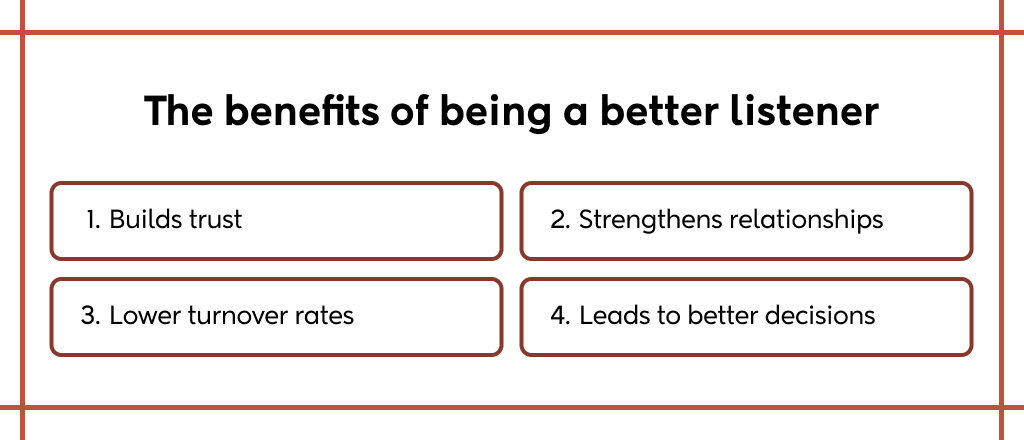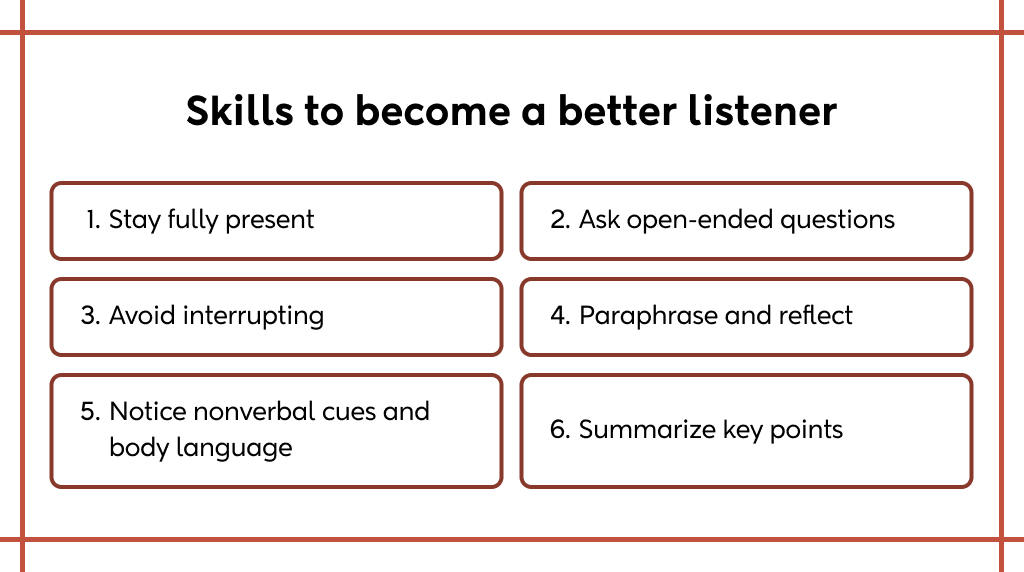As a manager, one of your biggest responsibilities is not just to lead but to listen. When you fail to listen, you miss valuable ideas, overlook warning signs, and risk making your team feel ignored. Over time, even your most engaged employees may stop speaking up. And one disengaged voice can quickly spread negativity, lowering morale across the team.
That’s why listening with intention matters. Good listening is not about staying silent. It’s about giving your full attention, understanding what’s being said, and responding in a way that makes your team feel heard and respected.
Listening is a skill that you can sharpen. In this article, I will share practical techniques along with benefits to help you listen actively and make your conversations more meaningful.
The benefits of being a better listener

Better listening builds stronger relationships between team members, which is something many of us struggle with. However, it’s not the only benefit; in fact, there are many more. Here are the top benefits of becoming a better listener.
1. Builds trust
When your team knows you are truly listening, it creates a sense of respect and value. They feel heard, and that makes them more confident in you as a leader. This trust encourages openness. Team members share ideas more freely because they believe their opinions will be considered, not ignored.
2. Strengthens relationships
When you take time to really hear what your team members are excited about, what challenges them, and what ideas they bring to the table, you are showing that you value them beyond just their role. That level of attention creates a sense of respect and belonging, which strengthens the bond between you and your team.
3. Lower turnover rates
People rarely leave companies, they leave managers who dont’ listen. When your team knows their concerns, ideas, and feedback matter to you, they’re more likely to stay committed to the company and to you as their leader.
4. Leads to better decisions
When you actively listen to different perspectives, you can make more informed decisions, considering all sides of an issue. Instead of relying on assumptions or your own limited viewpoint, you gain valuable insights from the team who are closest to the work.
Practical skills to become a better listener

To strengthen your listening skills, you need more than just hearing words. You need to understand the message, intent, and emotions behind them. This requires a different kind of skill set. Here are some practical techniques you can follow to become a better listener:
1. Stay fully present
Always focus on the speaker and try not to get distracted by external factors like your phone notifications, emails, or thoughts about your next meeting. When you divide your attention, the team notices. This looks like a small action, but it’s actually a big signal that tells the speaker,” I value what you are saying, keep moving forward, I am listening.
2. Ask open-ended questions
You should ask open-ended questions while listening to your teammates
These questions encourage your team to share their thoughts, ideas, and concerns in depth.
Instead of asking “Is everything okay with the project?” try something like “What challenges are you facing with the project right now?” Notice the difference? The first question shuts down the conversation, while the second opens the door to meaningful discussion.
Don’t hesitate to ask clarifying questions, too. If something isn’t clear, don’t fake understanding. Instead, say: “What I’m hearing is that the deadline feels too tight. Am I getting that right?” This shows your willingness to listen and get things right the first time.
3. Avoid interrupting
Listening isn’t just about staying quiet—it’s about giving someone the space to express themselves fully. When you interrupt, you send the message that your thoughts matter more than theirs.
Interruptions don’t always come as words. A raised eyebrow, an eye roll, or crossing your arms can signal judgment and break the speaker’s flow. These subtle cues can feel just as disruptive as cutting someone off mid-sentence.
When you feel the urge to speak, stop and let the other person finish first. Show you’re listening by saying short words like “okay” or “I understand” instead of jumping in. If you have something important to say, write it down and wait for your turn instead of cutting them off.
4. Paraphrase and reflect
Paraphrasing and reflecting are powerful techniques to ensure clarity and demonstrate genuine engagement.
Paraphrasing means rephrasing the speaker’s main point in your own words. For example, you might say, so you’re saying the deadline feels too tight and you’re worried about quality? This not only confirms that you’ve understood their message correctly but also gives the speaker an opportunity to clarify any misinterpretations.
Reflection goes a step further by acknowledging their emotions and concerns. For instance, “It sounds like you’re feeling a bit stressed about meeting this deadline. Did I get that right?” This not only give clarity to the situation but also help to identify any gaps in it.
5. Notice nonverbal cues and body language
A large part of communication is nonverbal, which means facial expressions, tone of voice, and body language often reveal more than what is spoken. Pay attention to these subtle cues to gain deeper insight into what the other person is truly feeling.
For example, a teammate saying “I’m fine” while avoiding eye contact or tensing their shoulders may actually be frustrated or stressed. Observing these signs allows you to respond with empathy and address concerns that may not have been explicitly stated.
6. Summarize key points
Before wrapping up a conversation, take a moment to restate the main ideas, themes, and any agreed-upon action items.
For example, you might say, “So, to summarize, we’ve decided to move forward with option A, and I will send the updated plan by Friday. Did I capture everything correctly?” This not only enhances the clarity of the meeting but also helps to add anything you may have missed.
Conclusion
As a manager, listening is one of the most powerful techniques you can use. It helps you dig deeper into the ideas and insights shared by your team and makes them feel valued and heard. When you truly listen, you build trust, improve collaboration, and encourage the team to share their best ideas. But real listening goes beyond staying quiet. It’s about being fully present– removing distractions, tuning into both words and emotions, and asking meaningful questions that show genuine interest. When you listen with intent, you don’t just hear your team, you lead with empathy and strength.





















No Comments